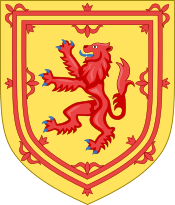Highland games
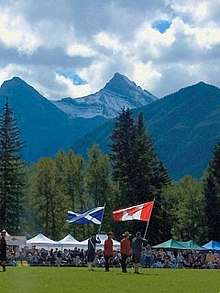
Highland games are events held in spring and summer in Scotland and other countries as a way of celebrating Scottish and Celtic culture, especially that of the Scottish Highlands. Certain aspects of the games are so well known as to have become emblematic of Scotland, such as the bagpipes, the kilt, and the heavy events, especially the caber toss. While centred on competitions in piping and drumming, dancing, and Scottish heavy athletics, the games also include entertainment and exhibits related to other aspects of Scottish and Gaelic culture.
The Cowal Highland Gathering, better known as the Cowal Games, held in Dunoon, Scotland, every August, is the largest Highland games in the world, attracting around 3,500 competitors and somewhere in the region of 23,000 spectators[1] from around the globe. Worldwide, however, it is exceeded in terms of spectators by two gatherings in the United States: the estimated 30,000[2] that attend Grandfather Mountain in North Carolina and the even larger gathering—the largest in the Northern Hemisphere[3]—that has taken place every year since 1866.[4] This event is currently held on Labor Day weekend in Pleasanton, California, and their Sesquicentennial Games held on September 5–6, 2015, attracted record crowds close to 50,000.[3]
The games are claimed to have influenced Baron Pierre de Coubertin when he was planning the revival of the Olympic Games. De Coubertin saw a display of Highland games at the Paris Exhibition of 1889.[5]
History
The origin of human games and sports predates recorded history. An example of a possible early games venue is at Fetteresso, although that location is technically a few miles south of the Scotland Highlands.
It is reported in numerous Highland games programs, that King Malcolm III of Scotland, in the 11th century, summoned contestants to a foot race to the summit of Craig Choinnich (overlooking Braemar). King Malcolm created this foot race in order to find the fastest runner in the land to be his royal messenger. Some have seen this apocryphal event to be the origin of today's modern Highland games.
There is a document from 1703 summoning the clan of the Laird of Grant, Clan Grant. They were to arrive wearing Highland coats and "also with gun, sword, pistol and dirk". From this letter, it is believed that the competitions would have included feats of arms.
However, the modern Highland games are largely a Victorian invention, developed after the Highland Clearances.
Events
Heavy events
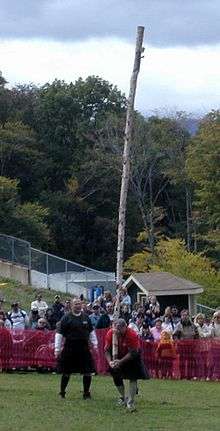
In their original form many centuries ago, Highland games revolved around athletic and sports competitions. Though other activities were always a part of the festivities, many today still consider Highland athletics to be what the games are all about—in short, that the athletics are the Games, and all the other activities are just entertainment. Regardless, it remains true today that the athletic competitions are at least an integral part of the events and one—the caber toss—has come to almost symbolize the Highland games.
Although quite a range of events can be a part of the Highland athletics competition, a few have become standard.
- Caber toss: A long log is stood upright and hoisted by the competitor who balances it vertically holding the smaller end in his hands (see photo). Then the competitor runs forward attempting to toss it in such a way that it turns end over end with the upper (larger) end striking the ground first. The smaller end that was originally held by the athlete then hits the ground in the 12 o'clock position measured relative to the direction of the run. If successful, the athlete is said to have turned the caber. Cabers vary greatly in length, weight, taper, and balance, all of which affect the degree of difficulty in making a successful toss. Competitors are judged on how closely their throws approximate the ideal 12 o'clock toss on an imaginary clock.
- Stone put: This event is similar to the modern-day shot put as seen in the Olympic Games. Instead of a steel shot, a large stone of variable weight is often used. There are also some differences from the Olympic shot put in allowable techniques. There are two versions of the stone toss events, differing in allowable technique. The "Braemar Stone" uses a 20–26 lb stone for men (13–18 lb for women) and does not allow any run up to the toeboard or "trig" to deliver the stone, i.e., it is a standing put. In the "Open Stone" using a 16–22 lb stone for men (or 8–12 lb for women), the thrower is allowed to use any throwing style so long as the stone is put with one hand with the stone resting cradled in the neck until the moment of release. Most athletes in the open stone event use either the "glide" or the "spin" techniques.
- Scottish hammer throw: This event is similar to the hammer throw as seen in modern-day track and field competitions, though with some differences. In the Scottish event, a round metal ball (weighing 16 or 22 lb for men or 12 or 16 lb for women) is attached to the end of a shaft about 4 feet in length and made out of wood, bamboo, rattan, or plastic. With the feet in a fixed position, the hammer is whirled about one's head and thrown for distance over the shoulder. Hammer throwers sometimes employ specially designed footwear with flat blades to dig into the turf to maintain their balance and resist the centrifugal forces of the implement as it is whirled about the head. This substantially increases the distance attainable in the throw.
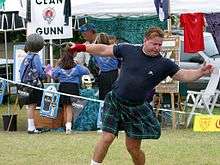
- Weight throw, also known as the weight for distance event. There are actually two separate events, one using a light (28 lb for men and 14 lb for women) and the other a heavy (56 lb for men, 42 lb for masters men, and 28 lb for women) weight. The weights are made of metal and have a handle attached either directly or by means of a chain. The implement is thrown using one hand only, but otherwise using any technique. Usually a spinning technique is employed. The longest throw wins.
- Weight over the bar, also known as weight for height. The athletes attempt to toss a 56-pound (4-stone) weight with an attached handle over a horizontal bar using only one hand. Each athlete is allowed three attempts at each height. Successful clearance of the height allows the athlete to advance into the next round at a greater height. The competition is determined by the highest successful toss with fewest misses being used to break tie scores.
- Sheaf toss: A bundle of straw (the sheaf) weighing 20 pounds (9.1 kg) for the men and 10 pounds (4.5 kg) for the women and wrapped in a burlap bag is tossed vertically with a pitchfork over a raised bar much like that used in pole vaulting. The progression and scoring of this event is similar to the Weight Over The Bar. There is significant debate among athletes as to whether the sheaf toss is in fact an authentic Highland event. Some argue it is actually a country fair event, but all agree that it is a great crowd pleaser.
- Maide-leisg (Scots Gaelic meaning 'Lazy Stick', pronounced [matʲəˈʎeʃkʲ]): Trial of strength performed by two men sitting on the ground with the soles of their feet pressing against each other. Thus seated, they held a stick between their hands which they pulled against each other until one of them was raised from the ground. The oldest 'Maide Leisg' competition in the world takes place at the Carloway show and Highland Games on the Isle of Lewis.
Many of the Heavy Events competitors in Scottish highland athletics are former high school and college track and field athletes who find the Scottish games are a good way to continue their competitive careers.
Increasingly in the USA, the Heavy Events are attracting women and master class athletes which has led to a proliferation of additional classes in Heavy Events competitions. Lighter implements are used in the classes.
Music
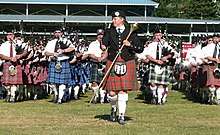
For many Highland games festival attendees, the most memorable of all the events at the games is the massing of the pipe bands. Normally held in conjunction with the opening and closing ceremonies of the games, as many as 20 or more pipe bands will march and play together. The result is a thunderous rendition of Scotland the Brave or Amazing Grace, and other crowd-pleasing favourites.
It is, in fact, the music of the bagpipe which has come to symbolize music at the Games and, indeed, in Scotland itself. In addition to the massed bands, nearly all Highland games gatherings feature a wide range of piping and drumming competition, including solo piping and drumming, small group ensembles and, of course, the pipe bands themselves.
Music at Highland games gatherings also includes other forms, such as fiddling, harp circles and Celtic bands, usually spiced with a large amount of bagpipe music.
Dance
The Cowal Highland Gathering hosts the annual World Highland Dancing Championship. This event gathers the best competitive dancers from around the world who compete for the SOBHD sanctioned World Championship title.
Secondary events and attractions
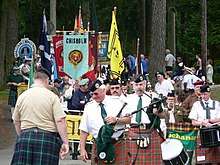
At modern-day Highland Games events, a wide variety of other activities and events are generally available. Foremost among these are the clan tents and vendors of Scottish related goods. The various clan societies make the Highland games one of the main focus of their seasonal activities, usually making an appearance at as many such events as possible. Visitors can find out information about the Scottish roots and can become active in their own clan society if they wish.
At modern games, armouries will display their collections of swords and armour, and often perform mock battles. Various vendors selling Scottish memorabilia are also present selling everything from Irn-Bru to the stuffed likeness of the Loch Ness Monster.
Herding dog trials and exhibitions are often held, showcasing the breeder's and trainer's skills. In addition, there may be other types of Highland animals present, such as the Highland cattle.
Various traditional and modern Celtic arts are often showcased. These could include harpers' circles, Scottish country dancing, and one or more entertainment stages. In addition, most events usually feature a pre-event ceilidh (a type of social event with traditional music, dancing, song, and other forms of entertainment).
Various food vendors will also offer assorted types of traditional Scottish refreshment and sustenance.
Major events in Scotland
| Location | Name of Event | Details |
|---|---|---|
| Blair Atholl, Perthshire | Atholl Gathering[6] | Europe's only private army, the Atholl Highlanders, open the games in the grounds of Blair Castle |
| Braemar, Aberdeenshire | Braemar Gathering | Attended by the British Royal Family. |
| Burntisland, Fife | Burntisland Highland Games | Second oldest in the world |
| Carloway, Western Isles | Carloway Show and Highland Games | Home to the oldest 'Maide Leisg' competition in the world |
| Ceres, Fife | Ceres Highland Games | Oldest free games in Scotland |
| Crieff, Perthshire | Crieff Highland Games | Home of the Scottish Heavyweight Championships and has HRH the Earl of Strathearn (Prince William) as the Royal Chieftain |
| Cupar, Fife | Cupar Highland Games[7] | Started in 1979 |
| Dunoon, Argyllshire | Cowal Highland Gathering | Biggest games in Scotland |
| Glenisla, Angus | Glenisla Highland Games[8] | Started in 1869 |
| Gourock, Inverclyde | Gourock Highland Games[9] | The first Highland games of the Scottish season - held on the second Sunday in May |
| Halkirk, Caithness | Halkirk Highland Games | Started in 1886 |
| Inverkeithing, Fife | Inverkeithing Highland Games | |
| Lochearnhead, Perthshire | Balquhidder, Lochearnhead and Strathyre Highland Games | Cameron, MacLaren and MacGregor clans linked to the games |
| Luss, Dunbartonshire | Luss Highland Gathering | Clan Colquhoun linked to the games. Held regularly since 1875. |
| Strathdon, Aberdeenshire | Lonach Highland Gathering & Games | Held by The Lonach Highland & Friendly Society Est. 1823, features the march of the Lonach Highlanders consisting of Forbes, Wallace and Gordons |
| Perth, Perthshire | Perth Highland Games | Held on the second Sunday in August |
| Pitlochry, Perthshire | Pitlochry Highland Games | |
| Portree, Inverness-shire | Isle Of Skye Highland Games | |
| St. Andrews, Fife | St. Andrews Highland Games | |
| Stirling, Stirlingshire | Stirling Highland Games | First Stirling Highland Games were held in July 1870 |
| Inverness, Inverness-shire | Inverness Highland Games | Staged in the world's oldest highland games stadium, Northern Meeting Park |
Major events outside Scotland
Australia
| Location | Name |
|---|---|
| Daylesford, Victoria | Highland Gathering |
Belgium
| Location | Name |
|---|---|
| Alden Biesen | Scottisch weekend |
Bermuda
| Location | Name |
|---|---|
| Somerset (2012); Pembroke (2013) | Bermuda Highland Games |
Brazil
| Location | Name |
|---|---|
| Estância Velha, Rio Grande do Sul | Scout Highland Games - GEJL46RS |
| Sapucaia do Sul, Rio Grande do Sul | Scottish Highland Games Brazil |
Canada
On 1 August 1997 Canada Post issued 'Highland Games' designed by Fraser Ross, based on photographs by Andrew Balfour. The 45¢ stamps are perforated 12.5 x 13 and were printed by Canadian Bank Note Company, Limited.[10]
| Location[11] | Name | Month Held |
|---|---|---|
| Alberta | ||
| Calgary, Alberta | Calgary Highland Games[12] | September |
| Canmore, Alberta | Canmore Highland Games[13] | August |
| Edmonton, Alberta | Edmonton Scottish Society Highland Gathering[14] | May |
| Grande Prairie, Alberta | Grande Prairie Highland Games[15] | June |
| High River, Alberta | Foothills Highland Games[16] | August |
| Red Deer, Alberta | Red Deer Highland Games[17] | June |
| British Columbia | ||
| Coquitlam, British Columbia | BC Highland Games | June |
| Kamloops, British Columbia | Kamloops Highland Games[18] | July |
| Penticton, British Columbia | Penticton Scottish Festival[19] | July |
| Victoria, British Columbia | Victoria Highland Games[20] | May |
| Manitoba | ||
| Selkirk, Manitoba | Manitoba Highland Gathering[21] | June |
| Winnipeg, Manitoba | Pavilion of Scotland, Folklorama[22] | August |
| Winnipeg, Manitoba | Transcona Highland Gathering[23] | September |
| New Brunswick | ||
| Fredericton, New Brunswick | New Brunswick Highland Games[24] | July |
| Moncton, New Brunswick | Moncton Highland Games[25] | June |
| Perth-Andover, New Brunswick | Gathering of the Scots Festival[26] | May |
| Nova Scotia | ||
| Antigonish, Nova Scotia | Antigonish Highland Games[27] | July |
| New Glasgow, Nova Scotia | Festival of the Tartans & Highland Games[28] | July |
| Ontario | ||
| Almonte, Ontario | North Lanark Highland Games[29] | August |
| Cambridge, Ontario | Cambridge Highland Games[30] | July |
| Cobourg, Ontario | Cobourg Highland Games[31] | June |
| Embro, Ontario | Embro Highland Games[32] | July |
| Fergus, Ontario | Fergus Scottish Festival and Highland Games[33] | August |
| Georgetown, Ontario | Georgetown Highland Games[34] | June |
| Kincardine, Ontario | Kincardine Scottish Festival & Highland Games[35] | July |
| Kingston, Ontario | Kingston Scottish Festival | May |
| Maxville, Ontario | Glengarry Highland Games | August |
| Sutton, Ontario | The Georgina Gathering[36] | June |
| Uxbridge, Ontario | The Highlands of Durham Games[37] | July |
| Quebec | ||
| Montreal, Quebec | Montreal Highland Games[38] | August |
| Saskatchewan | ||
| Moose Jaw, Saskatchewan | Saskatchewan Highland Gathering & Festival (not to be held in 2015)[39] | May |
| Regina, Saskatchewan | Saskatchewan Highland Gathering & Festival[40] | May |
Czech Republic
| Location | Name |
|---|---|
| Brno | MonteBú Highland Games[41] |
| Sychrov Castle | Skotské hry Sychrov[42] |
Hungary
| Location | Name |
|---|---|
| Csesznek, Veszprém | Scottish Highland Games (Skót Felföldi Játékok) |
| Zichyújfalu, Fejér | Highland Games Cup (Felföldi Játékok Kupa)[43] |
Indonesia
| Location | Name |
|---|---|
| Jakarta | Jakarta Highland Gathering |
New Zealand
| Location | Name |
|---|---|
| Hororata | Hororata Highland Games (2011) |
| Fairlie, New Zealand | Mackenzie Easter Show & Highland Games (1898) |
| Paeroa | Paeroa Highland Games & Tattoo (1993) |
| Turakina | Turakina Highland Games (1864) |
| Waipu | Waipu Highland Games (1871) |
Switzerland
| Location | Name |
|---|---|
| Abtwil, St. Gallen | Appowila Highland Games |
| Fehraltdorf, Zurich | Highland-Games Fehraltdorf[44] |
United States
| Location[11] | Name |
|---|---|
| Santa Cruz County, California | Scottish Renaissance Festival featuring the Loch Lomond Highland Games & Celtic Gathering[45] |
| Pleasanton, California | Scottish Highland Gathering and Games[46] |
| San Diego, California | San Diego Scottish Highland Games & Gathering of the Clans[47] |
| Ventura, California | Seaside Highland Games[48] |
| Woodland, California | Sacramento Valley Scottish Games & Festival[49] |
| Elizabeth, Colorado | Elizabeth Celtic Festival[50] |
| Hartford, Connecticut | Pipes in the Valley[51] |
| Dunedin, Florida | Dunedin Highland Games and Festivals[52] |
| Green Cove Springs, Florida | Northeast Florida Scottish Highland Games[53] |
| Marianna, Florida | The Big Bend Highland Games & Scottish Festival[54] |
| Sarasota, Florida | Sarasota Highland Games[55] |
| Blairsville, Georgia | Blairsville Scottish Festival & Highland Games[56] |
| Stone Mountain, Georgia | Stone Mountain Highland Games and Scottish Festival[57] |
| Honolulu, Hawaii | Hawaiian Scottish Festival and Highland Games[58] |
| Indianapolis, Indiana | Indianapolis Scottish Highland Games and Festival[59] |
| Columbus, Indiana | Columbus Scottish Festival and Highland Games[60] |
| South Bend, Indiana | Celtic Festival and Bryan Verkler Invitational Highland Games |
| Davenport, Iowa | Celtic Festival and Highland Games of the Quad-Cities[61] |
| Eminence, Kentucky | Highland Renaissance Festival[62] |
| Glasgow, Kentucky | Glasgow Highland Games |
| Baton Rouge, Louisiana | The Highland Games of Louisiana[63] |
| Mount Airy, Maryland | Frederick Celtic Festival |
| St. Leonard, Maryland | Southern Maryland Celtic Festival and Highland Gathering[64] |
| Alma, Michigan | Alma Highland Festival and Games[65] |
| Livonia, Michigan | St. Andrew's Society of Detroit Highland Games[66] |
| St. Charles, Missouri | Missouri Tartan Day Festivities[67] |
| St. Louis, Missouri | St. Louis Scottish Games and Cultural Festival[68] |
| Lincoln, New Hampshire | New Hampshire Highland Games[69] |
| Old Westbury, New York | Scottish Festival and Games[70] |
| Olcott, New York | Niagara Celtic Heritage Festival & Highland Games[71] |
| Huntersville, North Carolina | Loch Norman Highland Games[72] |
| Laurinburg, North Carolina | Scotland County Highland Games[73] |
| Linville, North Carolina | Grandfather Mountain Highland Games[74] |
| Winston-Salem, North Carolina | Bethabara Highland Games[75] |
| Tulsa, Oklahoma | SCOTFEST[76] |
| Portland, Oregon | Portland Highland Games[77] |
| Bethlehem, Pennsylvania | Celtic Classic Highland Games & Festival[78] |
| Ligonier, Pennsylvania | Ligonier Highland Games[79] |
| Charleston, South Carolina | Charleston Scottish Games and Highland Gathering[80] |
| Greenville, South Carolina | Gallabrae Greenville Scottish Games |
| Elizabethton, Tennessee | Scottish Heavy Athletics Clinic and Competition / East Tennessee Celtic Festival[81] |
| Gatlinburg, Tennessee | Gatlinburg Scottish Highland Games[82] |
| Maryville, Tennessee | Smoky Mountain Highland Games at Maryville College[83] |
| Arlington, Texas | Texas Scottish Festival and Highland Games[84] |
| Austin, Texas | Austin Celtic Festival[85] |
| Houston, Texas | Houston Celtic Festival and Highland Games[86] |
| Delaplane, Virginia | Virginia Scottish Games and Festival[87] |
| Kelso, Washington | Kelso Highlander Festival[88] |
| Bridgeport, West Virginia | North Central West Virginia Scottish Festival and Celtic Gathering[89] |
| Milwaukee, Wisconsin | Milwaukee Highland Games[90] |
| Radford, Virginia | Radford Highlander's Festival[91] |
| Estes Park, Colorado | Longs Peak Scottish-Irish Highland Festival[92] |
| Lehi, Utah | Utah Scots Festival |
| Tucson, Arizona | Tucson Celtic Festival & Scottish Highland Games[93] |
| Las Vegas, Nevada | Las Vegas Celtic Society Highland Games[94] |
See also
Notes
- ^ Cowal Highland Gathering can be verified as the world's largest highland games on the Official Scottish Tourist Board Website at VisitScotland.com
- ^ For a modern-day fictional account of this event, see The origins of the Braemar Games Hill Race, by Les Wheeler
- ^ Many Highland games web sites contain a brief sketch on the history of the Highland games. Most will mention this hill climb, some referring to it as a story or legend, others as if it were an established fact. Webster, in Scottish Highland Games recounts the story, labelling it as story, or legend only. Thomas Owen Clancy and Barbara E. Crawford, in the Bibliographical essay to chapter 2 (The Formation of the Scottish Kingdom) of The New Penguin History of Scotland state: "Little of significance has been written about the eleventh century kingdom otherwise, except on the dispute over the reliability of the early documentary sources...".
- ^ As quoted on the history page of the Aboyne Highland Gathering web site
- ^ The web site of the International Wrestling Association reports rather more expansively on the role of the 1889 Paris event and its effect on the development of the Olympics, considering it to have had a "huge impact" on world sport. An article published in 2004 in the Christian Science Monitor points to two other events, including that of Much Wenlock, a small English village in Shropshire
References
- ↑ "Cowal Highland Gatcitationhering". Archived from the original on 9 August 2012. Retrieved 10 July 2012.
- ↑ "Grandfather Mountain Highland Games Fast Facts".
- 1 2 "Scottish Games Draw Record Crowds". The Independent. Retrieved 2015-09-20.
- ↑ "150th Scottish Highland Gathering & Games". thescottishgames.com. Retrieved 2015-09-20.
- ↑ Horne, Marc (25 April 2010). "Highland games were the model for modern Olympics". London: The Times. Retrieved 3 May 2010.
- ↑ "The Atholl Gathering". Scottish Castles - Blair Castle - Atholl Estates. Retrieved 19 February 2015.
- ↑ "Cupar Highland Games". cuparhighlandgames.org. Retrieved 18 June 2018.
- ↑ "Glenisla Highland Games". glenislahighlandgames.co.uk. Retrieved 19 February 2015.
- ↑ "Gourock Highland Games". gourockhighlandgames.org.uk. Retrieved 19 February 2015.
- ↑ "Canadian Postal Archives Database". collectionscanada.gc.ca. Retrieved 19 February 2015.
- 1 2 "Calendar of Highland Games and Scottish Events in North America". Clan Campbell Society. Archived from the original on 12 February 2010. Retrieved 25 May 2014.
- ↑ "Calgary Highland Games". calgaryhighlandgames.org. Retrieved 19 February 2015.
- ↑ "CANMORE HIGHLAND GAMES". canmorehighlandgames.ca. Retrieved 19 February 2015.
- ↑ "Edmonton Scottish Society". edmontonscottishsociety.org. Retrieved 19 February 2015.
- ↑ "Grande Prairie Highland Games". gphighlandgames.com. Retrieved 19 February 2015.
- ↑ "Foothills Highland Games". foothillshighlandgames.com. Retrieved 19 February 2015.
- ↑ Addie Otto. "Red Deer Highland Games Association Home Page". reddeerhighlandgames.ca. Retrieved 19 February 2015.
- ↑ "The Kamloops Highland Games - July 11th 2015". kamloopshighlandgames.ca. Retrieved 19 February 2015.
- ↑ "Welcome to the Penticton Scottish Festival". Welcome to the Penticton Scottish Festival. Retrieved 19 February 2015.
- ↑ "Local Burns Events". victoriahighlandgames.com. Retrieved 19 February 2015.
- ↑ "Manitoba Highland Gathering". Manitoba Highland Gathering. Retrieved 19 February 2015.
- ↑ Homefront Studios. "Ceud Mile Failte!". pavilionofscotland.ca. Retrieved 19 February 2015.
- ↑ "Transcona Highland Gathering". transconahighlandgathering.org. Retrieved 20 March 2018.
- ↑ "New Brunswick Highland Games Festival - Fredericton, 2008 ::". highlandgames.ca. Retrieved 19 February 2015.
- ↑ "Moncton Highland Games". Retrieved 19 February 2015.
- ↑ "Gathering of the Scots - Home". gatheringofthescots.com. Retrieved 19 February 2015.
- ↑ "Antigonish Highland Games". antigonishhighlandgames.ca. Retrieved 19 February 2015.
- ↑ "Festival of the Tartans & Highland Games". festivalofthetartans.ca. Retrieved 19 February 2015.
- ↑ "North Lanark Highland Games - Home". almontehighlandgames.com. Retrieved 19 February 2015.
- ↑ "Cambridge Highland Games". cambridgehighlandgames.com. Archived from the original on 3 February 2015. Retrieved 19 February 2015.
- ↑ "The 52nd Annual Cobourg Highland Games Festival". cobourghighlandgames.ca. Retrieved 19 February 2015.
- ↑ "Embro Highland Games - Something for everyone". Embro Highland Games. Retrieved 19 February 2015.
- ↑ "Fergus Scottish Festival and Highland Games". Brampton Guardian, Aug 13, 2014
- ↑ "Georgetown Highland Games". georgetownhighlandgames.com. Retrieved 19 February 2015.
- ↑ "Kincardine Scottish Festival and Highland Games - Kincardine Ontario Canada". kincardinescottishfestival.ca. Retrieved 19 February 2015.
- ↑ "The Georgina Gathering June 21, 2014". georginagathering.ca. Archived from the original on 3 February 2015. Retrieved 19 February 2015.
- ↑ "The Highlands of Durham Games". highlandsofdurhamgames.com. Retrieved 19 February 2015.
- ↑ "Montreal Highland Games". montrealhighlandgames.qc.ca. Retrieved 19 February 2015.
- ↑ Goudy, Lisa (12 September 2014). "No highland games in Moose Jaw in 2015". Moose Jaw Times-Herald. Retrieved 19 February 2015.
- ↑ "Saskatchewan Highland Gathering & Festival". saskhighland.ca. Retrieved 19 February 2015.
- ↑ "= MonteBú Highland Games, Czech Rep".
- ↑ "= Highland games Sychrov, Czech Rep".
- ↑ "Felföldi Játékok Kupa Zichyújfaluban" (in Hungarian). Velencei-tó Portál. Retrieved 21 February 2014.
- ↑ "Highland-Games". Retrieved March 20, 2014.
- ↑ "Santa Cruz Scottish Festival". santacruzscottishfestival.org. Retrieved 19 February 2015.
- ↑ "150th Scottish Highland Gathering & Games". thescottishgames.com. Retrieved 19 February 2015.
- ↑ "San Diego Scottish Highland Games". sdhighlandgames.org. Retrieved 19 February 2015.
- ↑ "Ventura Seaside Highland Games Home Page". seaside-games.com. Retrieved 19 February 2015.
- ↑ "Sacramento Scot Games". sacramentoscotgames.org. Retrieved 19 February 2015.
- ↑ "Elizabeth Celtic Festival". elizabethcelticfestival.com. Retrieved 19 February 2015.
- ↑ "Pipes in the Valley". elizabethcelticfestival.com. Retrieved 26 September 2015.
- ↑ "Dunedin Highland Games and Festival". Dunedin Highland Games and Festival. Retrieved 19 February 2015.
- ↑ "Northeast Florida Scottish Games & Festival". neflgames. Retrieved 19 February 2015.
- ↑ "Big Bend Scots". bigbendscots.com. Archived from the original on 21 May 2013. Retrieved 19 February 2015.
- ↑ "Sarasota Highland Games and Celtic Festival". sarasotahighlandgames.com. Retrieved 19 February 2015.
- ↑ "Blairsville Scottish Festival - Welcome to the blairsville scottish festival website". blairsvillescottishfestival.org. Retrieved 19 February 2015.
- ↑ "Stone Mountain Highland Games". Retrieved 19 February 2015.
- ↑ "Hawaiian Scottish Festival and Highland Games". Retrieved 10 March 2017.
- ↑ "Indianapolis Scottish Highland Game and Festival". indyscotgamesandfest.com. Retrieved 12 August 2015.
- ↑ "Columbus Scottish Festival". scottishfestival.org. Retrieved 19 February 2015.
- ↑ "Celtic Games". celtichighlandgames.org. Retrieved 19 February 2015.
- ↑ "Kentucky Renaissance Fair". Kentucky Renaissance Fair. Retrieved February 19, 2015.
- ↑ "The Highland Games of Louisiana". Retrieved 5 March 2015.
- ↑ "Southern Maryland Celtic Festival". The Celtic Society of Southern Maryland. Retrieved 19 February 2015.
- ↑ "Alma Highland Festival". almahighlandfestival.com. Retrieved 19 February 2015.
- ↑ "St. Andrew's Society of Detroit Highland Games". highlandgames.com. Retrieved 5 May 2017.
- ↑ "Missouri Tartan Day". motartanday. Retrieved 19 February 2015.
- ↑ "St. Louis Scottish Games". stlouis-scottishgames.com. Retrieved 19 February 2015.
- ↑ "The New Hampshire Highland Games & Festival". nhscot.org. Retrieved 19 February 2015.
- ↑ "Long Island Scottish Clan MacDuff". liscots.org. Retrieved 19 February 2015.
- ↑ Vicki Banks (1 January 2007). "NiagaraCeltic.com: Welcome to the Niagara Celtic Community: Home for All Things Irish, Scottish & Welsh in North America!". niagaraceltic.com. Retrieved 19 February 2015.
- ↑ http://www.ruralhillscottishfestivals.net/. Missing or empty
|title=(help) - ↑ "Scotland County Highland Games". schgnc.org. Retrieved 19 February 2015.
- ↑ "Grandfather Mountain Highland Games". gmhg.org. Retrieved 19 February 2015.
- ↑ "Bethabara Highland Games". Retrieved 31 May 2017.
- ↑ "Oklahoma Scotfest". Retrieved 14–16 September 2018. Check date values in:
|accessdate=(help) - ↑ "Portland Highland Games Association". phga.org. Retrieved 29 June 2015.
- ↑ "Celtic Classic 2015 - Bethlehem, PA - Highland Games, Irish and Celtic Music Festival". celticfest.org. Retrieved 19 February 2015.
- ↑ "Ligonier Highland Games 2014". ligonierhighlandgames.org. Retrieved 19 February 2015.
- ↑ "Scottish Society of Charleston". charlestonscots.org. Retrieved 19 February 2015.
- ↑ "Upper East Tennessee Celtic Society". Retrieved 19 February 2013.
- ↑ "Gatlinburg Scottish Highland Games - our 30th year in this location". gatlinburg-scottish-highland-games.org. Retrieved 19 February 2015.
- ↑ "Scottish Festival and Games". smokymountaingames.org. Retrieved 19 February 2015.
- ↑ "Texas Scottish Festival". Retrieved 19 February 2015.
- ↑ "Austin Celtic Festival". austincelticfestival.com. Retrieved 19 February 2015.
- ↑ "Houston Highland Games Association". houstonhighlandgames.com. Retrieved 19 February 2015.
- ↑ "Virginia Scottish Games and Festivals". vascottishgames.org. Retrieved 19 February 2015.
- ↑ "Highlander Festival". City of Kelso. Retrieved 19 February 2015.
- ↑ "North Central West Virginia Scottish Festival & Celtic Gathering". North Central West Virginia Scottish Festival & Celtic Gathering. Retrieved 19 February 2015.
- ↑ "MILWAUKEE HIGHLAND GAMES". Retrieved August 19, 2016.
- ↑ "19th Annual Highlanders Festival - Radford University". Retrieved 25 May 2015.
- ↑ "Longs Peak Scottish-Irish Highland Festival". Estes Park. Archived from the original on 23 November 2015. Retrieved September 2016. Check date values in:
|accessdate=(help) - ↑ "Tucson Celtic Festival and Scottish Highland Games". www.tucsoncelticfestival.org.
- ↑ "Las Vegas Celtic Society". http://www.lasvegascelticsociety.org/. Retrieved 2 April 2017. External link in
|website=(help)
| Wikimedia Commons has media related to Highland games. |
Bibliography
- Michael Brander, Essential Guide to the Highland Games (1992) ISBN 0-86241-302-8
- Emily Ann Donaldson, The Scottish Highland Games in America (Pelican Publishing Company, Gretna, LA, 1986). ISBN 0-88289-474-9.
- Joan F. Flett and Thomas M. Flett, Traditional Dancing in Scotland (London: Routledge & Kegan Paul 1964, 1985), ISBN 0-7102-0731-X
- John G. Gibson, Traditional Gaelic Bagpiping, 1745-1945 (McGill-Queen's University Press, Montreal, 1998). ISBN 0-7735-1541-0. See esp. chapter 15, "Highland Games and Competition Piping"
- Ian R. Mitchell, "Rheumatism, Romanticism and Revolution: Victoria, Balmorality and 1848" in History Scotland (Vol. 5, #5, September/October 2005)
- John Prebble, The King's Jaunt (Edinburgh: Birlinn Ltd,1988., 2000), ISBN 1-84158-068-6
- Hugh Trevor-Roper, "The Invention of Tradition: The Highland Tradition of Scotland." in The Invention of Tradition ed. Eric Hobsbawm and Terence Ranger. Cambridge: Cambridge University Press, 1983, ISBN 0-521-24645-8.
- David Webster, Scottish Highland Games (Edinburgh, Scotland 1973)
External links
| Look up Category:Highland games in Wiktionary, the free dictionary. |
- The Scottish Highland Games Association
- Official Scottish Tourist Board Highland Games Calendar 2011
- COSCA Council of Scottish Clans and Associations
- Highland Games FAQ: What to know before you go
- US Scots: includes extensive listing of Highland games events
- Tulloch Inverness Highland Games - Masters World Championships
- The Official Highland Games Swiss Championships
- What Are Highland Games?
